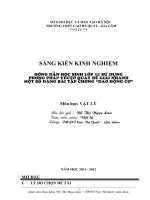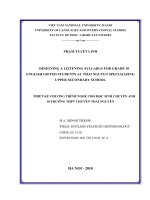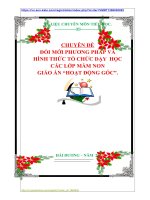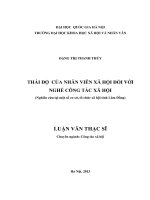English-language gifted students'' attitudes towards project-based approach to learning writing = Thái độ của học sinh chuyên Anh đối với phương pháp dự án trong
Bạn đang xem bản rút gọn của tài liệu. Xem và tải ngay bản đầy đủ của tài liệu tại đây (133.33 KB, 3 trang )
1
VIETNAM NATIONAL UNIVERSITY, HANOI
UNIVERSITY OF LANGUAGES AND INTERNATIONAL STUDIES
FACULTY OF POST-GRADUATE STUDIES
___________________________________
NGUYỄN THỊ THU HUYỀN
English-language gifted students' attitudes
towards project-based approach to
learning writing
THÁI ĐỘ CỦA HỌC SINH CHUYÊN ANH ĐỐI VỚI PHƯƠNG PHÁP
DỰ ÁN TRONG VIỆC HỌC VIẾT
M.A. MINOR THESIS
FIELD: METHODOLOGY
CODE: 601410
HANOI - 2010
6
TABLE OF CONTENTS
Declaration ………………………………………………………………………………… …i
Acknowledgements …………………………………………………………………………….ii
Abstract ……………………………………………………………………………………… iii
Lists of tables ……………………………………………………………………………….…iv
Lists of abbreviations ………………………………………………………………………….iv
Table of contents ……………………………………………………………………………….v
PART ONE: INTRODUCTION …………………………………………………………… 1
1. Rationale …………………………………………………………………………………….1
2. Aims of the study ……………………………………………………………………………1
3. Scope of the study ………………………………………………………………………… 2
4. Methods of the study …………………………………………………………………… …2
5. Significance of the study …………………………………………………………………….2
6. Structure of the thesis …………………………………………………………………… …3
PART TWO: DEVELOPMENT …………………………………………………………….4
CHAPTER 1: LITERATURE REVIEW ………………………………………………………4
1.1. Writing …………………………………………………………………………………….4
1.1.1 Definitions of Writing …………………………………………………………… …4
1.1.2. The importance of writing ………………………………………………………… 5
1.1.3. Approaches to teaching writing …………………………………………………… 6
1.1.3.1. The product approach …………………………………………………………7
1.1.3.2. The process approach ………………………………………………………….8
1.2. Project-based learning ……………………………………………………………………12
1.2.1. Definitions of project-based learning …………………………………………….…12
1.2.2. Types of projects………… 13
1.2.3. Advantages of project-based learning ………………………………………………14
1.2.4. Disadvantages of Project-based Learning ………………………………………… 15
1.2.5. Process of Project-based Work …………………………………………………… 16
1.2.6. Project-based Approach and Other Approaches to Writing ……………………… 17
7
CHAPTER 2: THE STUDY ………………………………………………………………….19
2.1. Setting of the study ………………………………………………………………………19
2.1.1. Hung Vuong specializing High School …………………………………………… 19
2.1.2. The English Language Teacher Group …………………………………………… 20
2.1.3. Participants and time allocation…………………………………………………… 21
2.2. Data collection ………………………………………………………………………… 23
2.2.1. Instruments for data collection ………………………………………………… …23
2.2.2. Data collection procedures ………………………………………………………….24
2.2.3. Data analysis ……………………………………………………………………… 25
2.2.3.1. Average time spent on each project ………………………………………….25
2.2.3.2. Strategies used in carrying out the projects ………………………………….25
2.2.3.3. Problems of PBL …………………………………………………………… 26
2.2.3.4. Benefits of PBL ………………………………………………………………28
2.2.3.5. Students' satisfaction of doing writing projects ………………………… …30
2.2.4. Findings and Discussion ……………………………………………………………31
PART THREE: CONCLUSION ………………………………………………………… 34
1. Summary of the major findings ……………………………………………………………34
2. Implications for Classroom Practice ……………………………………………………….35
3. Limitations of the study ……………………………………………………………………35
4. Suggestions for future studies …………………………………………………………… 36
REFERENCES …….…………………………………………………………………………37
APPENDIX









